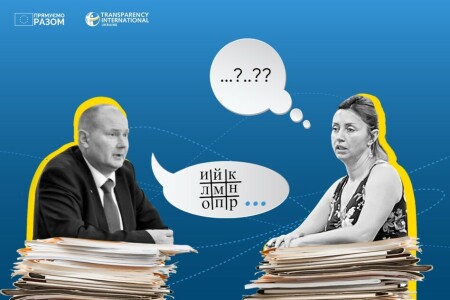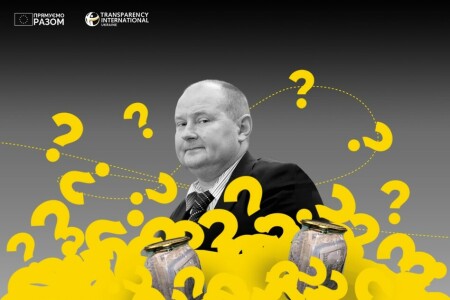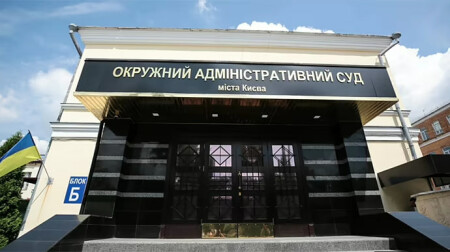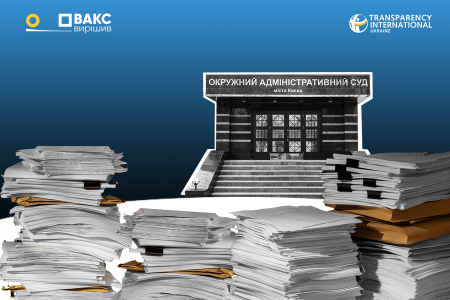Previously in the Trial Play:
The drama surrounding Mykola Chaus’ trial began back in 2016, when the judge of the Dniprovskyi District Court of Kyiv was caught allegedly accepting a $150,000 bribe in cash. According to the prosecution, he divided the money into two parts: $80,000 was placed in a two-liter glass jar and buried on a plot of land between the roadway and a fence, while the remaining $70,000 was left in another jar—this one conveniently stashed in his car.
What followed only added fuel to the fire: Chaus’s sudden flight to Moldova, a tangled tale of abduction, his dramatic return to Ukraine, and loud proclamations about being set up by NABU. There was talk of “hara-kiri,” “treacherous friends,” a bizarre car chase through Kyiv, and open demands from NABU to the SSU to hand Chaus over. Eventually, all the chaos gave way to a judicial review of the case.
Characters:
Mykola Chaus — ex-judge of the Dniprovskyi District Court of Kyiv, the accused
Diana Polishchuk — a petitioner (whistleblower)
Oleksandr Polishchuk — NABU secret agent, ex-husband of Diana Polishchuk
Svitlana Sasevych — mother of Diana Polishchuk, accused of trafficking in potent substances and precursors — diphenhydramine, pseudoephedrine
Disputable matter — provocation of a crime
What did the HACC decide?
The court of first instance examined the case for approximately one and a half years. The indictment was submitted in November 2021, and on June 14, 2023, the court delivered its verdict: ten years of imprisonment with confiscation of property.
The HACC found it proven that Mykola Chaus, in his capacity as a judge, solicited an unlawful benefit in the amount of $100,000 from Diana Polishchuk in exchange for rendering a decision in favor of Svitlana Sasevych.
At the same time, the court found the charge of extortion of an unlawful benefit unproven, as the prosecution failed to demonstrate that the defendant’s request constituted a clear and unequivocal demand that left Diana Polishchuk with no alternative but to comply.
Moreover, the court of first instance concluded that, in the course of this criminal proceeding, the pre-trial investigation authorities had provoked the commission of a crime by inciting Mykola Chaus to accept a particularly large bribe in exchange for imposing a suspended sentence in the case of Svitlana Sasevych.
In particular, the court noted that, during a conversation with Mykola Chaus on March 28, 2016, Oleksandr Polishchuk exceeded the scope of merely monitoring the commission of a crime on behalf of NABU detectives and, through his statements, incited Chaus to accept a bribe—despite the fact that the defendant had previously declined to engage in such conduct. As a result, the court deemed the evidence obtained through this provocation inadmissible.
Accordingly, the HACC found it unproven that Mykola Chaus received a bribe of $150,000 from Oleksandr Polishchuk and excluded the qualification of “receiving a bribe combined with extortion” from the charges.
However, both the prosecution and the defense disagreed with the verdict and subsequently filed appeals.
Why did the prosecution file an appeal?
Although the court delivered a guilty verdict, the prosecution disagreed with the conclusions reached in the course of its adoption. In the appeal, the prosecutor requested that the verdict be amended with regard to the court’s recognition of certain evidence as inadmissible due to the alleged provocation of a crime, as well as its finding of insufficient proof to support the charge of Mykola Chaus obtaining an unlawful benefit. In particular, the prosecutor pointed to inconsistencies between the court’s findings, as outlined in the judgment, and the actual circumstances established during the criminal proceedings.
In the appeal, the prosecutor argued that Oleksandr Polishchuk was not an undercover agent of any law enforcement body. His involvement in the criminal proceedings, the prosecutor noted, was not connected to the execution of any official assignment by law enforcement agencies, but rather stemmed from personal ties and his participation in confidential cooperation.
The prosecutor also maintained that the court’s conclusion regarding provocation was not supported by the evidence, arguing that the materials from covert investigative actions—including those deemed inadmissible—demonstrated the passive role of law enforcement officers and the active conduct of Chaus himself, including the use of conspiracy measures, deliberate actions, an escalation in the requested amount of the unlawful benefit, and instructions concerning the method of its transfer.
Therefore, the SAPO prosecutor contends that the trial established the fact that Chaus received $150,000. The prosecutor also requested a re-examination of the evidence that had been excluded by the court.
What arguments do Chaus and his defense rely on in their appeals?
In his appeal, Mykola Chaus requested that the verdict be amended by reclassifying his actions from Article 368(4) to Article 368(1) of the Criminal Code of Ukraine, and that the circumstances established during the criminal proceedings be re-examined.
In their joint appeal, the defense requested that the verdict be overturned and the proceedings closed on the grounds of insufficient evidence of guilt and the exhaustion of possibilities to obtain such evidence. They also petitioned for a re-examination of the written materials in the case.
They also pointed to:
-
the incompleteness of the trial;
-
inconsistencies between the court’s conclusions and the factual circumstances;
-
significant violations of the Criminal Procedure Code of Ukraine;
-
incorrect application of the provisions of the Criminal Code of Ukraine.
In addition, the defense challenged the jurisdiction of the High Anti-Corruption Court and other Ukrainian courts, arguing that Chaus’s extradition from Moldova had not been completed. They contended that, following the decision to deny extradition, the criminal proceedings should have been closed pursuant to Article 284(1)(8) of the Criminal Procedure Code of Ukraine. The defense also asserted that any evidence collected during this period was inadmissible.
The defense also:
-
claimed that the available materials prove Chaus' innocence;
-
pointed out signs of provocation on the part of law enforcement officers, Diana and Oleksandr Polishchuk;
-
stated that all the evidence collected was inadmissible.
A separate argument presented by the defense was that Chaus received the $100,000 as a loan, allegedly confirmed by a written note. According to the defense, these funds were unrelated to the consideration of the Sasevych case and did not constitute an unlawful benefit.
The defense also argued that after Chaus declined to assist Diana Polishchuk on March 25, 2016, the prosecutor should have closed the proceedings due to the absence of elements of a criminal offense, in accordance with Article 284(1)(2) of the Criminal Procedure Code of Ukraine, rather than continuing the provocation by involving Oleksandr Polishchuk.
The HACC AC Research of evidence and arguments of the parties. Was there a provocation?
The appeal proceedings were initiated in July 2023, transferred in September 2023, and in April 2025, the HACC AC overturned the original verdict and issued a new one.
Why did the court overturn the verdict?
During the appeal review, the panel of judges of the Appeals Chamber of the High Anti-Corruption Court, acting upon the parties’ requests and in order to determine whether provocation had taken place, re-examined all the evidence—both that which served as the basis for Mykola Chaus’s conviction at first instance and that which had previously been declared inadmissible. The court also directly questioned the witnesses Oleksandr and Diana Polishchuk.
The HACC AC found that the conclusion of the court of first instance—regarding Chaus’s alleged refusal to accept an unlawful benefit and the purported provocation of the accused—did not correspond to the evidence collected in the case.
The court draws attention to the fact that, on the one hand, the verdict states that Oleksandr Polishchuk appealed to Chaus: “Look, what about approaching this one, the head?”—which allegedly incited the latter to receive illegal benefits. On the other hand, Polishchuk allegedly created conditions for the continuation of criminal activity that Chaus had previously voluntarily declined to pursue.
The court of first instance, having established the occurrence of provocation involving Mykola Chaus, also concluded that the acts imputed to him were unproven.
The panel of the HACC AC disagreed with this conclusion and emphasized that a refusal must be both voluntary and final.
The reasons for refusing to complete the crime are legally irrelevant, as an individual may also provide false information regarding the motives for such refusal.
The panel established that the convicted judge did not refuse to complete the incriminated criminal offense, and that the receipt of the unlawful benefit was not the result of provocation.
Chaus’s conduct confirms his intention to complete the offense, as evidenced by the following:
-
Although he claimed it was not possible to deliver the “necessary” sentence, this statement was made only after Diana Polishchuk indicated that she did not have the full amount—only $50,000.
-
Chaus informed Polishchuk about his conversation with Diana and the challenges of delivering the sentence due to the position of the alleged court chairman. However, after Polishchuk inquired whether he should meet with the head of the court to “resolve problematic issues,” no further discussions on the matter took place between them.
-
Chaus not only failed to mention any refusal but, on the contrary, continued to discuss the terms of transferring the unlawful benefit, initiated an increase in the amount to $150,000, and provided detailed instructions regarding the timing, method of transferring the funds, and the conditions for delivering the sentence.
The defendant did not revisit the issue of potential “obstacles” from the court chairman and continued to take actions directed toward completing the offense.
The panel of judges of the HACC AC found no indication of provocation on the part of the applicant or her former husband.
The High Anti-Corruption Court noted in its verdict—which the Appeals Chamber fully upheld—that the detective was entitled to continue the investigation, at the very least to confirm that the defendant’s refusal to complete the offense was final.
The panel of judges believes that the phrase of the witness: “Look, what about approaching this one, the head?” had no character of incitement. The defendant did not react to it as an impetus to commit a crime but, on the contrary, continued to implement his intention independently. Chaus agreed to receive an illegal benefit and did so not because Polishchuk said so, but as a result of his own intent to enrich himself by abusing his official position.
Polishchuk did not approach the chairperson of the court, nor did Chaus request him to do so. The witness did not undertake any other actions that could be regarded as contributing to the commission of a criminal offense or provoking Chaus to commit it.
Therefore, the court of appeal concluded that Chaus, in his capacity as a judge, received a bribe in the amount of $150,000 in exchange for issuing a suspended sentence to pensioner Svitlana Sasevych, who had been convicted of trading in diphenhydramine.
In providing a legal assessment of the established factual circumstances, the panel of judges concurred with the court of first instance that the actions for which Chaus was charged did not constitute extortion of unlawful benefits. He received the benefit in response to a request that bore no signs of extortion, as he neither expressed threats nor created conditions that would have compelled individuals to provide him with unlawful benefits.
Abduction, political persecution and extradition proceedings
The panel of judges of the HACC AC also analyzed the arguments of the defense regarding:
-
illegal criminal prosecution of Mykola Chaus in Ukraine without the consent of the Republic of Moldova, from which he was abducted before the extradition procedure was completed;
-
political motives of the prosecution.
With regard to the allegation of unlawful prosecution in Ukraine, the court rejected these arguments, citing the following circumstances:
-
Chaus’s complaints were dismissed by court decisions;
-
the courts found that Chaus had not provided credible evidence to substantiate claims of persecution by the Ukrainian authorities on the grounds of his political views or criticism of the Ukrainian government;
-
the fact of his legal entry into the territory of the Republic of Moldova was not established;
-
Neither the law enforcement agencies, the courts, nor the President of Moldova identified any indications of unlawful prosecution of Chaus by Ukraine.
As for political motives, the panel of judges recognized these arguments as groundless. The panel justified their position with the following arguments:
-
information about the criminal offense was entered into the Unified State Register of Pretrial Investigations on March 14, 2016;
-
the indictment was submitted to the court in November 2021;
-
during this period, Ukraine saw changes in its presidents, prosecutors general, heads of SAPO, the composition of the Verkhovna Rada, and the government — which, in the court’s view, indicates the absence of political bias.
However, the court concluded that the materials of the criminal proceedings did not contain any indications of possible involvement by employees of NABU, SAPO, or the Prosecutor General’s Office in the abduction of Mykola Chaus. Furthermore, it found that the alleged abduction was unrelated to the efforts of NABU detectives to bring Chaus to criminal liability.
The court also rejected the remaining arguments of the defense, finding them to be contradicted by the evidence examined during the appellate review.
In overturning the verdict of the first instance and issuing a new one, the panel of judges emphasized that punishment serves not only as a form of retribution but also as a means of rehabilitating the convicted person and preventing the commission of future crimes. While it entails restrictions on the rights and freedoms of the offender, the punishment must be proportionate to the offense committed and take into account the individual characteristics of the defendant.
When overturning the verdict of the court of first instance and adopting a new one, the court of appeal is required to impose a sentence on the defendant directly, taking into account the general principles of sentencing, the gravity of the offense, the identity of the offender, and the presence of any mitigating or aggravating circumstances. In this case, the court did not identify any circumstances that would mitigate or aggravate the punishment.
Article 368(4) of the Criminal Code of Ukraine provides for a sentence of eight to twelve years of imprisonment, along with deprivation of the right to hold certain positions or engage in certain activities for up to three years, and confiscation of property. The High Anti-Corruption Court, applying the logic of the “midpoint” within the prescribed range, imposed a sentence of ten years’ imprisonment.
However, the HACC AC reached a different conclusion. Although the scope of the proven charges slightly increased, this did not alter the legal qualification of Mykola Chaus’s actions and therefore did not warrant the imposition of a more severe sentence.
The court also took into account the following circumstances:
-
the defendant’s age (57 years);
-
his dismissal from the position of judge;
-
the presence of chronic illnesses requiring inpatient treatment;
-
his generally appropriate conduct during the appeal proceedings.
Taking all these factors into consideration, the panel of judges concluded that a principal sentence of eight years and six months of imprisonment would be adequate.
How long could Chaus remain behind bars after the HACC Appeals Chamber’s decision?
The Appeals Chamber of the High Anti-Corruption Court sentenced Chaus to 8.5 years of imprisonment. However, during the pre-trial investigation and trial, Chaus was subjected to detention, round-the-clock house arrest, and custody. Accordingly, the court took these periods into account and credited them toward the term of his primary sentence.
-
Chaus was held in detention for two days, from August 3 to August 4, 2021.
-
He remained under round-the-clock house arrest from August 4, 2021, to January 31, 2022, with the time credited toward his sentence at a rate of three days of house arrest for each day of imprisonment.
-
He was held in detention from June 14, 2023, to April 3, 2025, with the time credited toward his sentence at a rate of one day of detention for two days of imprisonment.
In total, these periods amount to approximately three years and nine months. Accordingly, Chaus has approximately four years and nine months remaining to serve in prison.
The proceedings illustrate how differently courts may assess the presence or absence of provocation, and underscore the importance of a thorough judicial analysis of the participants’ conduct.
Cassation proceedings have now been initiated in the case, and we will continue to monitor further developments.
Author: Oksana Kopiichuk, Legal Advisor, Transparency International Ukraine





.png)

.png)

